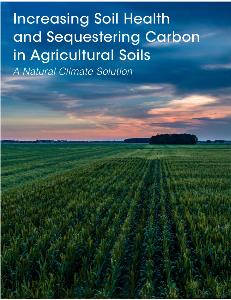Increasing Soil Health and Sequestering Carbon in Agricultural Soils: A Natural Climate Solution
By Dr. Sara Via, University of Maryland
 Agriculture can become a significant part of the American climate solution by increasing the use of farming practices that improve soil health, reduce greenhouse gas emissions, and store carbon in the soil while providing economic benefits for farmers.
Agriculture can become a significant part of the American climate solution by increasing the use of farming practices that improve soil health, reduce greenhouse gas emissions, and store carbon in the soil while providing economic benefits for farmers.
Although Earth's soil can store over twice the amount of carbon found in the atmosphere, agricultural soils worldwide have become severely degraded, losing a large fraction of their sequestered carbon and the ability to sustain productive crop growth in just the past 150 years.
Basic principles identified by the U.S. Department of Agriculture can increase soil health and carbon storage by protecting soil organisms from disturbance or erosion and providing them with a constant food supply from living plant roots. This report outlines 24 USDA-approved management practices that use these principles to rebuild degraded soils on farms and ranches, and it provides estimates of their CO2 reduction potential in representative states based on USDA models.
The report highlights some of the other environmental benefits the practices deliver: reduced erosion, less polluted runoff, improved water quality, reduced need for irrigation, increased biodiversity and improved wildlife habitat.
The estimated economic value of healthy soil to farmers is $40 to $140 per acre because healthy soil boosts production, saves farmers money on costly inputs like fertilizer, herbicides, pesticides, fuel, equipment, maintenance, and labor, and improves the resilience of farms to climate change.
Despite the economic and environmental benefits of the carbon-sequestering practices discussed in this report, adoption rates remain low. Key strategies to increase adoption include increased outreach to farmers, well designed incentive programs, and accurate and up to date technical assistance.
Implementing these strategies and the other recommendations in this report will allow us to realize a significant and cost-effective opportunity to slow climate change, address other environmental problems, and provide economic benefits for America’s farmers and ranchers.
Key Recommendations
- Make soil health a central focus of USDA programs, and boost soil health and carbon sequestration efforts at all levels of government.
- Strengthen soil health education and outreach programs, and expand our capacity to deliver accurate and up to date technical assistance on soil health and carbon sequestration practices.
- Expand existing incentive programs and develop and fund new ones to help farmers adopt these climate-friendly practices, and increase equity and inclusion in delivering USDA conservation programs.
- Establish a National Soil Monitoring Network, fund regular soil testing by farmers to monitor changes in soil health, make USDA data more available to researchers, and increase funding for needed research.
Read the report